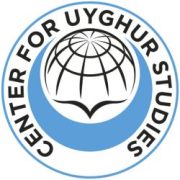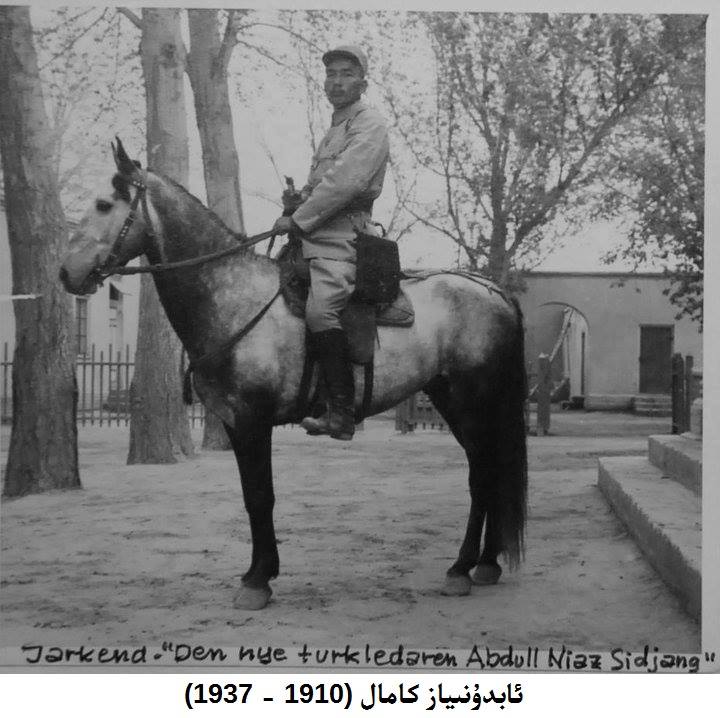Uyghur Figures – 08
Abduniyaz Kamal
Born in 1910 in the Turpan region, Abduniyaz Kamal received his primary education at the religious school in his village. His education continued until he graduated in February 1932, after which he pursued a career in agriculture.
In December 1931, during the Turpan Uprising led by leaders such as Hamdullah Damolla, Maqsud Muhiti, Mahmud Muhiti, Mawsul Muhiti, and Abdulla Bek Naimi, Abduniyaz Kamal actively participated in the revolution, engaging in numerous battles across several cities. In May and June of 1933, he retreated along with other volunteers as Hojaniyaz headed south.
By September 29, 1933, when Hojaniyaz withdrew from Aksu to Uchturpan, Abduniyaz accompanied him. He stayed with the rebels there for a month to prepare for their march to Kashgar. They set out for Kashgar on November 3, 1933, under pressure from Ma Chung-ying’s troops, and reached Kashgar on January 8, 1934. Upon arriving in Kashgar, he joined the revolutionaries in the struggle for control of the city.
On April 13, 1934, when Hojaniyaz arrived in Yarkand, Abduniyaz also accompanied him on this journey. When Sheng Shicai appointed Hojaniyaz as the Deputy Chair of the provincial government, Mahmud Muhiti as the head of the Southern Defense Army, and the additional commander of the Sixth Brigade, Abduniyaz Kamal assumed leadership of the first company in the Third Battalion under Mahmud Muhiti’s army in Yarkand. He remained in Yarkand until April 4, 1937, when Mahmud Muhiti left East Turkistan with 16 individuals.
On April 5, 1937, without a leader, 2,000 soldiers gathered in Hotan to bid farewell to Mahmud Muhiti. In a unanimous decision, Abduniyaz was elected as their leader. During 1937, Abduniyaz Kamal faced off against the Soviet Union, one of the world’s greatest powers, and the government of Sheng Shicai. He displayed courage and valor before the people, and his actions are still recounted with reverence.
Following his promotion, Abduniyaz Kamal reorganized his forces in Hotan, elevated the ranks of officers, and organized the army into four ranks. After preparations were complete, on April 12, 1937, he launched an attack against Sheng Shicai’s government and seized Yarkand, placing the three districts of Yarkand, Maralbeshi, and Poskam under his control.
In May 1937, negotiations were held with the military leader of the Tungan faction, Ma Husan, in Qarghiliq, and they decided to unite and fight against Sheng Shicai’s government. According to the agreement, Ma Husan handed over 300 armed soldiers with advanced weaponry. They journeyed together to Kashgar.
Muhyiddin, one of Kamal’s lieutenants, led 600 soldiers to the old city of Kashgar. His troops reached Kashgar on May 29, 1937, and they encountered resistance from over 300 soldiers of Ishaq Beg Munonov in the old city of Kashgar.
On May 30, both sides fiercely contested control of the division headquarters in Yumilaq city. When the Soviet consul in Kashgar learned of this situation, he mediated between them, and an agreement was reached between Said, Ishaq, and Abduniyaz.
As per the agreement, Said took his forces to Yengisheher, leaving Konasheher to Abduniyaz’s forces. On June 1, 1937, news arrived from Urumchi about the arrival of ten vehicles carrying soldiers to Aksu. Upon hearing this news, Abduniyaz consulted with Ma Husan and decided that Ma Husan would stay in Kashgar and defend the city, while Abduniyaz would lead 1,400 soldiers from the Uyghurs and Tungans to Maralbeshi to prevent the advancing forces from Urumchi.
Upon reaching Aksu, Abduniyaz regrouped his entire unit, deployed his armies in several regions, and sent the company commander Dawud with 100 soldiers to Kucha and Shahyar to engage in guerrilla warfare. Due to his wise leadership, he increased his soldiers to 500 and trained them rigorously. They engaged in victorious battles in Shahyar, Kucha, Bugur, and Qarashahar, causing trouble for both the Chinese and Soviet soldiers who came to their aid and preventing them from returning to Aksu.
In early July 1937, after deploying most of his forces around Aksu, Abduniyaz, along with 100 men, headed for Uchturpan and defeated Sheng Shicai’s forces inside the walls, capturing the city. He then rallied the people of Uchturpan to build an ammunition factory and produce military equipment. They manufactured significant quantities of ammunition, explosives, uniforms, and horse saddles for the revolutionary forces in Maralbeshi, enhancing the conditions of his troops.
On August 5, 1937, Sheng Shicai’s forces, with the support of the Soviet Union, launched a general attack on Abduniyaz’s forces near Aksu with 1,000 soldiers. Despite the inferiority of their weapons and ammunition, Abduniyaz’s forces fiercely fought for several days against Sheng Shicai’s and the Soviet forces in Awat and Qumbashi under the command of Abduniyaz Kamal. However, due to the enemy’s numerical and weapon superiority, his forces retreated to Uchturpan, where they continued to confront Sheng Shicai’s forces with determination.
On September 5, 1937, Sheng Shicai, relying on the strength of the Soviet Union, attacked Abduniyaz’s forces for the second time with a thousand soldiers. Abduniyaz fiercely defended with more than a thousand men in Aykol and Qumbashi. This war was more severe than the previous battles, and they could not withstand the onslaught of Sheng Shicai’s forces. They retreated to the west, and Abduniyaz ordered all his soldiers to assemble in Maralbeshi. At that time, he had over a thousand men, including officials, servants, and soldiers. At this time, he learned through his spy that the Soviet Union had sent an army of 2,000 soldiers consisting of Kyrgyz, Uzbeks, Uyghurs, Kazakhs, Russians, and others to Maralbashi. 500 soldiers remained in Maralbashi to stop Abduniyaz’s forces, while 1,500 soldiers headed to Kashgar.
After learning that he was surrounded by Sheng Shicai and Soviet forces from behind, he ordered his army to withdraw to Merkit through the forest. After two days’ march, they passed Merkit and reached Yarkand, where they remained for several days. During this time, soldiers and volunteers came from Aksu, Uchturpan, Shahyar, Kucha, and other places, totaling 3,500 people. The investigation revealed the presence of Soviet forces in Yarkand. On September 18, 1937, Abduniyaz gathered the company commander, battalion, and advisors to discuss what to do and where to go. Everyone brought different points of view. After listening to everyone’s opinions, Abduniyaz Kamal said:
“Brothers and friends! If the mechanized forces of a great power like Russia – soldiers armed with planes, tanks, and armor – had not invaded our country, we would have won because we would have destroyed the government of Sheng Shicai and its followers, the arch enemy of our people. But the Soviet communists suppressed our anti-oppression revolution under the banner of helping oppressed countries. In short, by God’s will, we have fallen into a bad situation.
During the discussion, some people who had been with me in difficult battles offered to surrender to Russian soldiers, while others suggested going to India. I think this idea is very wrong. We are the brave ones who raised the sword against injustice. We revolted, liberating several million people in many cities. We fought heroically in many places, dealing a crushing blow to the tumultuous government of Sheng Shicai and its background of Russian soldiers. You who sit here remember these victorious battles. This government, now known as the Soviet government, interfered in our affairs and destroyed our revolution. Do we travel abroad with our foul souls? Leaving our friends and everyone who fought with us in difficult times, our fellow brothers who shared meals with us, and the volunteers who left their countries and brothers for us. Isn’t it considered an ugly thing for people like us who raise the sword against injustice? Or are we not satisfied with one loaf? Why did we raise the sword? Why did thousands of our friends die on the battlefield? How would we face them if we traveled abroad? We are content with death, and we will never flee abroad. Mahmud Muhiti fled abroad to save himself, so what happened? He has now forgotten his country and his people and has not even written a single letter to us! If we leave our country, we will face the same fate as that man, nothing more. I am your leader, and you have obeyed my commands. You don’t want a government other than mine.
Dear brothers! From this hour, I order you to disperse and take cover for yourselves. Of course, our bloodshed will not be in vain, and our next generation will remember these things. God bless you.”
After hearing his words, more than 3,500 soldiers and volunteers burst into tears. A man named Kichik Ahun asked, “What will Your Excellency do?” Abduniyaz replied, “I must try to save my own life as much as I can.” Upon hearing this response, Abduniyaz from Uchturpan, one of his personal guards, said, “I will be with Commander Abduniyaz. If he dies, I will die with him, and if he lives, I will live with him.”
After Abduniyaz ordered his forces to disperse, Kichik Ahun led 1,600 people to Yarkand and surrendered to the Soviet forces. After Abduniyaz left, Abdulla from Uchturpan joined him, and they journeyed together until they reached the village of Harab, where they stayed for a day in the house of a local farmer. They intended to migrate to India and set off until they reached the village inhabited by the Kyrgyz people. They stayed in the house of a Kyrgyz man.
On the next day, after the Fajr prayer, they saw soldiers surrounding them. After learning that these soldiers were Uyghurs, Abduniyaz called one of the soldiers and asked, “Which unit are you from?” The soldier replied, “We are soldiers of Yusuf from Turpan.”
Abduniyaz said, “Go and bring Yusuf here.” Yusuf came, greeted him as a military leader, and sat down to have tea and talk. Abduniyaz asked, “What will you do with me?” Yusuf replied, “We have come on orders from the government, inviting Your Excellency to Yarkand.”
After the conversation, Yusuf took Abduniyaz and his two companions, without disarming them, and handed them over to the government.
The Russians rewarded Yusuf with a rifle for his actions. Later, he was sent to fight in Hotan and when his mission was completed, they killed him.
Written by Tursun Barat in Uyghur, translated to English by CUS team.
Copyright Center for Uyghur Studies - All Rights Reserved

